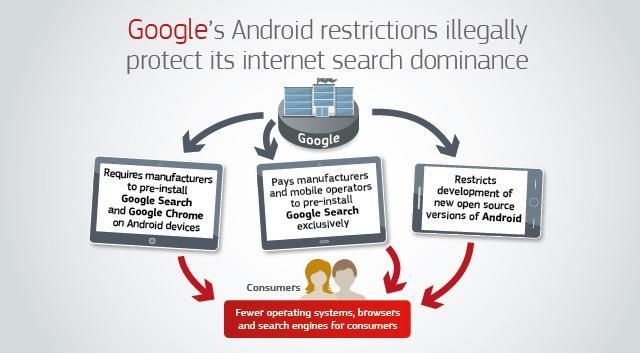
Says it illegally uses Android to dominate search
BRUSSELS – The European Commission today fined Google €4.34 billion (US$5 billion) for breaching European Union antitrust rules.
Since 2011, says the Commission, “Google has imposed illegal restrictions on Android device manufacturers and mobile network operators to cement its dominant position in general internet search,” reads its decision.
It must now bring the conduct to an end within 90 days or face penalty payments of up to 5% of the average daily worldwide revenue of Alphabet, Google's parent company, the decision continues. (The photo is from the EC release.)
"Today, mobile internet makes up more than half of global internet traffic. It has changed the lives of millions of Europeans. Our case is about three types of restrictions that Google has imposed on Android device manufacturers and network operators to ensure that traffic on Android devices goes to the Google search engine,” said Commissioner in charge of competition policy Margrethe Vestage. “In this way, Google has used Android as a vehicle to cement the dominance of its search engine. These practices have denied rivals the chance to innovate and compete on the merits. They have denied European consumers the benefits of effective competition in the important mobile sphere. This is illegal under EU antitrust rules."
Google’s three EU fouls are that it:
- has required manufacturers to pre-install the Google Search app and browser app (Chrome), as a condition for licensing Google's app store (the Play Store);
- made payments to certain large manufacturers and mobile network operators on condition that they exclusively pre-installed the Google Search app on their devices; and
- has prevented manufacturers wishing to pre-install Google apps from selling even a single smart mobile device running on alternative versions of Android that were not approved by Google (so-called "Android forks").
Google won’t simply be paying this ticket, however.
“The decision ignores the fact that Android phones compete with iOS phones, something that 89 percent of respondents to the Commission’s own market survey confirmed,” wrote Google CEO Sundar Pichai in a blog post. “It also misses just how much choice Android provides to thousands of phone makers and mobile network operators who build and sell Android devices; to millions of app developers around the world who have built their businesses with Android; and billions of consumers who can now afford and use cutting-edge Android smartphones.”
The device makers, added Pichai, can run all the same applications “thanks to simple rules that ensure technical compatibility, no matter what the size or shape of the device. No phone maker is even obliged to sign up to these rules—they can use or modify Android in any way they want, just as Amazon has done with its Fire tablets and TV sticks.
“To be successful, open-source platforms have to painstakingly balance the needs of everyone that uses them. History shows that without rules around baseline compatibility, open-source platforms fragment, which hurts users, developers and phone makers. Android’s compatibility rules avoid this, and help make it an attractive long-term proposition for everyone,” his blog post continued.
“Today’s decision rejects the business model that supports Android, which has created more choice for everyone, not less. We intend to appeal.”


